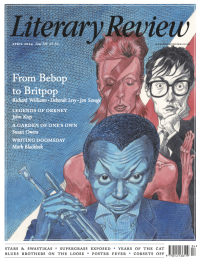Sophie Oliver
Dress to Transgress
All the Rage: Power, Pain, Pleasure – Stories from the Frontline of Beauty 1860–1960
By Virginia Nicholson
Virago 470pp £25
‘Don’t be a fright. Don’t wear loud-hued leggings. Don’t cultivate a “bicycle face”.’ Even on a bicycle, that emblem of their public freedom, women were offered stern words about how they should present themselves. Greater liberty in one aspect of women’s lives was often matched by new kinds of coercion in what they wore and how they looked. Virginia Nicholson’s history of modern women’s dedication to their appearance is full of ironies like this.
Whether in 1860 or 1960, rules abounded. Readers of The Lady’s Dressing-Room (1893) were advised to avoid exciting novels, especially late at night (risk of wrinkles), outdoor sports (might toughen the skin), violent emotions and slouching (unseemly). In The Way to Beauty (1955), Constance Moore instructed her followers to touch their toes twelve times each morning and adopt the banana and milk diet. Through etiquette guides, advice manuals, magazines, diaries and memoirs, Nicholson tells a disturbing story of women – predominantly white women in Britain and the United States – puffing, panting, pinching and worrying their way through a period of great change in their rights and visibility.
She is particularly good on how a body looks when styled according to the fashions and expectations of an era. A photograph from 1860 shows Princess Alexandra well covered and moulded into the shape of a bell: small on top, with a cinched waist, and huge below, upholstered

Sign Up to our newsletter
Receive free articles, highlights from the archive, news, details of prizes, and much more.@Lit_Review
Follow Literary Review on Twitter
Twitter Feed
The son of a notorious con man, John le Carré turned deception into an art form. Does his archive unmask the author or merely prove how well he learned to disappear?
John Phipps explores.
John Phipps - Approach & Seduction
John Phipps: Approach & Seduction - John le Carré: Tradecraft; Tradecraft: Writers on John le Carré by Federico Varese (ed)
literaryreview.co.uk
Few writers have been so eagerly mythologised as Katherine Mansfield. The short, brilliant life, the doomed love affairs, the sickly genius have together blurred the woman behind the work.
Sophie Oliver looks to Mansfield's stories for answers.
Sophie Oliver - Restless Soul
Sophie Oliver: Restless Soul - Katherine Mansfield: A Hidden Life by Gerri Kimber
literaryreview.co.uk
Literary Review is seeking an editorial intern.